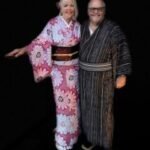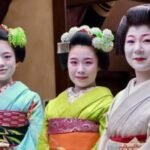From time to time, we will visit the Wayback Machine to read stories from The Senior Times archives. This story by Tsune Ochiai was published in October 1989.
I was invited to come to Canada in March 1919 as the bride of a young man who owned a grocery store on Main St. in Vancouver. I helped my husband at the store until the children were born. Just after the arrival of our third child, my husband fell ill. He needed a change of business. We started a furniture store on Powell St.
In about a year, my husband became ill again. He wanted to go back to Japan for an operation if it was necessary. After conferring with his brother and friends, he took a boat to Japan and was hospitalized in Osaka.
During his absence, I looked after the store while taking care of our children and household. We received a lot of help from my brother-in-law and our friends. After two months, we received a telegram from Osaka, telling us that my husband had recovered completely without any operation and he would be coming home soon. All of us were overjoyed.
After four years, however, it became evident that the nature of the business — having to carry heavy loads all the time — was hard on my husband’s health. We had to sell our business again and move on to Alexander St.
My husband was not in good health and we didn’t have many assets left to depend on. To save our children from poverty, I had to take a job. A friend helped me seek employment as a housekeeper, my halting English notwithstanding. I ran an ad in the paper and soon started working for Canadian families.
In those days of rampant racial discrimination, Japanese Canadian youths armed with college degrees could not find any work other than as labourers at sawmills or as gardeners. For Japanese Canadian women it was the same.
Working as a housekeeper, I never lost my pride as a Japanese Canadian woman. The money I earned was not much, but it allowed our family of five to live modestly.
I worked hard with honesty and loyalty as my motto. My employers rewarded me with complete trust so that I never lacked work. (Even after the relocation started, no one cancelled my work. Consequently, we were one of the last families to board the train leaving Vancouver in 1942.)
Meanwhile, our children received honours of distinction at school; this makes me very proud and happy. Then my husband recovered and he started working as a gardener.
In 1937, our eldest daughter, Kayou, went to Japan as the first Nisei student ever to go back for studies. She came back to Vancouver in 1941 to become a teacher at her alma mater. Even though the school had to be closed after Pearl Harbour, she could resume her teaching at the government-run schools in Japanese Canadian relocation camps. Later, she met and married a Canadian from Port Arthur, Ont. They had a boy named Ronnie and led happy lives there.
My husband and I spent four years in Roseberry and Tashme relocation camps. After the war, we worked as farmers in the Farnham camp for a year. I learned the job of a finisher of men’s suits at a nearby factory so that when we joined our son, Mikio, in Montreal 1947, I could find that kind of job.
My husband passed away in 1949.
Mikio went to Montreal soon after the war and became a commercial artist. My husband’s last words were that he was satisfied with our son and heir’s prospects. It was of great solace to me that he had no regrets in life.
At Christmas in 1949, my son and I were baptized, which gave me great peace of mind. Mikio bought a car, a house, and finally got married in 1953. Grandson Tommy was born the next year and everything seemed rosy.
In September of the following year, I was diagnosed as having breast cancer. Dr. Hori operated on me successfully. Cobalt radiation therapy followed and I was fully recovered. Now was the time to visit our homeland.
Our second daughter, Yukie, followed her sister’s footsteps and had gone over to Japan for studies. When she finished her schooling, the war had already begun. The International Red Cross informed us that she was teaching in Hikone City. She got married there.
I went back to Japan in 1955, after 36 years of life in Canada. I was extremely happy to see our daughter again; she had a son and a daughter. Eight months passed like a dream. Satisfied, I returned to Canada.
On my way to Montreal, I saw Kayou and her family at Port Arthur and spent two happy weeks there. Everything seemed satisfactory for me. I felt I could go to heaven any day. Next March, however, my son-in-law in Port Arthur had a heart attack at his office and passed away suddenly. He was only 37 years old. No words could describe our sorrow.
My daughter decided to go back to teaching to support herself and her six-year-old son, Ronnie. I went there for three years to help out. Their property was too large to be managed by women alone. After consulting with my son, she sold everything there and moved to Montreal.
A year passed and when things were settling down nicely, my daughter caught influenza, which developed into pneumonia. She was hospitalized and received the best treatments available. But in a month, she too was gone.
She had asked me to look after her son. I grieved heavily for her loss but her last request was sacred. It was my hope that he would grow up to be a man of honour and courage.
My son and his wife treated Ronnie as one of their own. Ronnie graduated from McGill University as an engineer. He also obtained an MBA. He is now married to another McGill graduate. They have two children.
Even though my life in Canada has not been easy, I was able to visit my mother country three times. I served 10 years as a committee member for both the Japanese School and the United Church Sunday School in Vancouver. I joined the Montreal Japanese United Church in 1949 and have been serving as a recording secretary for the Issei Women’s Group. My essays have been included in several documentary publications on the Japanese community in Vancouver.
I am blessed with six grandchildren. Five of them are married, giving me six great grandchildren.
Written as a legacy for posterity on June 2, 1987, Tsune Ochiai’s 91st birthday.









